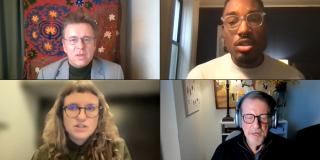Human Rights Policing Global Lens
On December 15, 2021 the Unitarian Universalist Association’s office at the United Nations (UU@UN) hosted an event on “Human Rights and Policing Through a Global Lens.” This event was created to educate people on current global policing policies and how those policies affect those in marginalized communities who are vulnerable to discrimination. The event explored ways in which these policies and interactions with police can be improved.
The first speaker on the panel moderated by UU@UN Director Bruce Knotts was Johan Olhagen, who has been working for the United Nations Office of the High Commissioner for Human Rights (UN Human Rights) since 2006. Amongst his many roles at the UN, he advises UN Human Rights colleagues globally on issues related to standards, good practices, and training methodologies for police. He spoke about the need for better training, recruitment, and retention for policing worldwide. Observing the often conflictual relationship between police forces and protesters, he gave a prime example of how community policing could operate positively in relation to peaceful protesting. He related an incident from a protest in Kathmandu, Nepal in 2008 where a senior police officer, unarmed, was able to negotiate rules and conduct for how the police and protestors should act, which resulted in a nonviolent protest. Johan also touched upon the fact that a country’s colonial past or history of conflict also has an impact on policing. This needs to be taken into account as the relationship between police forces and the communities they serve may need to heal from these histories. Although training is important, Johan emphasized looking at countries’ laws and that human rights have to be integrated into these laws for more positive policing.
The second panelist was Karolina Łukasiewicz, Ph.D, who spoke on the current situation at the Polish-Belarusian border. She is an adjunct professor at New York University (NYU) at the Silver School of Social Work and a Marie Sklodowska-Curie Fellow at the Centre of Migration Research at the University of Warsaw. Outside of her academic responsibilities she works with various NGOs directly supporting immigrant populations. Her expertise and research has been focused on migrant integration and poverty policies. Karolina addressed the policing of migrant and refugee communities. The human rights violations at the Poland border highlighted horrific treatment of migrant groups, which is often overlooked among global policing and human rights issues. She emphasized that while there are good laws and regulations in place as to how people should be treated when seeking asylum at a country’s borders, unfortunately the police on the ground may be unable or unwilling to implement these rules. Karolina spoke of border activists and non-profit organizations like Families without Borders who help these refugee and migrant communities file cases in human rights courts over mistreatment and violations.
The last speaker was Joshua Ware, LCSW. Joshua is also an adjunct professor at NYU’s Silver School of Social Work and a licensed social worker in private practice, as well as an author and training specialist. Joshua described militarized policing in the United States, the history of policing marginalized communities and mass incarceration of Black and Brown people, and the long-term effects of trauma related to policing and police brutality. Joshua brought his experience as a community organizer, and his personal experiences to round out the panel. He spoke about how trauma from encounters with police affect the human body and the health of Black and Brown communities, manifesting in increased rates of hypertension and diabetes, which limit life spans. He also discussed the dangers of being constantly triggered by seeing the police. He gave an example of one of his students who was brutalized by a police officer in the back of a squad car and the effect on this student who must continue to see this same officer on his way to school. Joshua expressed his belief in defunding the police and putting more resources toward mental health practitioners who can respond to and de-escalate certain events with or without the police before they turn violent or deadly.
Each of these brilliant panelists provided an overview of policing policies from a different perspective and gave examples of ways to improve and reflect upon interactions with the police. They furthered discussions of how the amount of training impacts how policing is done, and how implicit bias in officer training should be accounted for, especially for vulnerable communities. The speakers highlighted positive examples implemented in the U.S. and abroad that show changes are occurring, even if those changes are slow. While there are often many bad means of policing, we must also educate ourselves and others on the good, using those as an example of how we can improve global policing policy to ensure communities are safe for everyone.
View the event recording and read speakers' full bios at the Human Rights and Policing event webpage.
